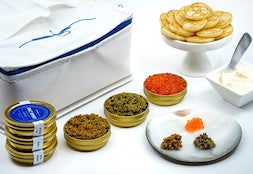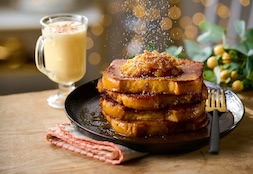The bomb pop was invented in 1955, the year your father was born, in the America you think about when you
think about America.
Post-war boom and suburban sprawl, sprawling backyards and screen doors, twilit baseball played against a symphony of grasshoppers and laughter and the faraway jingle of the ice cream truck, moseying into the frame from another dimension. The comforting buzz of the TV, TV dinners, off to work in the morning and pecks upon return, the equipoise of the nuclear family, the threat of nuclear war. Colors red, white and blue cascading down the side of a child’s hand.
You remember your first one, too, don’t you? The smell of hot pavement and car exhaust, a parent’s hand powerful and gentle on your back. It was always given to you. Unsheathed from white paper packaging, freezing to the touch. Tastes different towards the top than it does near the bottom. You’re not sure how to tackle this thing. Your face feels sticky. It begins to melt, as it always does, before you’re ready for it to. The fireworks explode in the distance, a sonic blast of color. You’re not old enough to understand the irony of the name: bomb pop.
Years later, on the grounds of your summer camp, you stand on the slope leading down to the beach, the black lake water aglow in the gloaming. There are girls here. Cargo shorts and big t-shirts and the gluey smell of heavily applied lip gloss, melancholy in the gap between the young and the younger. From below, burger smoke trails into the sky. Is there anything more American than the smell of ketchup and dirt? Amongst the ice cream and the apple pie there is again the popsicle that only seems to make an appearance once a year: a jingoistic missile made up of sugar and food coloring. You take one, sit on the ground with the others and watch the firework embers peter out and fall into the lake.
Every Fourth of July, you're a different person, but there persists the same old bomb pop. Like the holiday itself it is impervious to time, a pagan to a vision of America frozen in photographs. If only for the few precious moments before it melts.
Post-war boom and suburban sprawl, sprawling backyards and screen doors, twilit baseball played against a symphony of grasshoppers and laughter and the faraway jingle of the ice cream truck, moseying into the frame from another dimension. The comforting buzz of the TV, TV dinners, off to work in the morning and pecks upon return, the equipoise of the nuclear family, the threat of nuclear war. Colors red, white and blue cascading down the side of a child’s hand.
You remember your first one, too, don’t you? The smell of hot pavement and car exhaust, a parent’s hand powerful and gentle on your back. It was always given to you. Unsheathed from white paper packaging, freezing to the touch. Tastes different towards the top than it does near the bottom. You’re not sure how to tackle this thing. Your face feels sticky. It begins to melt, as it always does, before you’re ready for it to. The fireworks explode in the distance, a sonic blast of color. You’re not old enough to understand the irony of the name: bomb pop.
Years later, on the grounds of your summer camp, you stand on the slope leading down to the beach, the black lake water aglow in the gloaming. There are girls here. Cargo shorts and big t-shirts and the gluey smell of heavily applied lip gloss, melancholy in the gap between the young and the younger. From below, burger smoke trails into the sky. Is there anything more American than the smell of ketchup and dirt? Amongst the ice cream and the apple pie there is again the popsicle that only seems to make an appearance once a year: a jingoistic missile made up of sugar and food coloring. You take one, sit on the ground with the others and watch the firework embers peter out and fall into the lake.
Every Fourth of July, you're a different person, but there persists the same old bomb pop. Like the holiday itself it is impervious to time, a pagan to a vision of America frozen in photographs. If only for the few precious moments before it melts.






